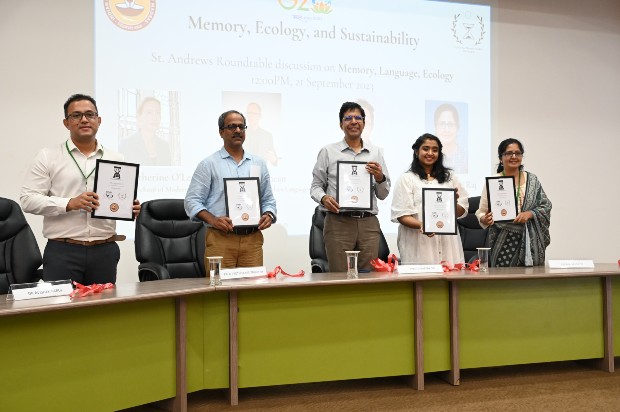IIT Madras’ Centre for Memory Studies launches ‘MovingMemory’ app
It is a spatial app that uses the technology of Augmented Reality & Virtual Reality simultaneously, developed with the potential to inhabit the metaverse world, that captures various moving models of memory through digital reconstruction
CHENNAI : Indian Institute of Technology Madras (IIT Madras) Centre for Memory Studies has launched a ‘MovingMemory’ app that uses the technology of Augmented Reality and Virtual Reality simultaneously. It captures various moving models of memory through digital reconstruction.
‘MovingMemory’ can be accessed either through mobile apps (Android and iOS) or through browser-based platforms, making it uniquely inclusive in quality. It is a spatial app, developed with the potential to inhabit the metaverse world.
The functions of the app enable the user to select any desired avatar and navigate through three-dimensional spaces. It is embedded with additional layers of video, audio, 3D images, and interactive elements which may be used as models for sustainable and heritage-oriented pedagogic and research approaches.
The ‘MovingMemory’ was launched during the second annual Indian Network for Memory Studies conference titled ‘Memory, Ecology, and Sustainability’, an international conference being conducted by the Indian Network for Memory Studies and the Centre for Memory Studies at IIT Madras from 20th to 22nd September 2023.
The conference was inaugurated on 20th September 2023 by Prof. V. Kamakoti, Director, IIT Madras, in the presence of Ms. Seema Massot, Director, American Centre, US Consulate General, Chennai, Prof. Jyotirmaya Tripathy, Head, Department of Humanities and Social Sciences, IIT Madras and the faculty coordinators Dr Avishek Parui and Dr. Merin Simi Raj.
Addressing the inaugural session, Prof. V. Kamakoti, Director, IIT Madras, said, “It is crucial that we foreground the urgent need to incorporate collective memory in our understanding and ability to anticipate policies related to ecological issues such as climate change. Human as well as non-human forms of memory (such as the memory of water and the memory of nature) such as the Spanish Flu and the 2015 Chennai floods may be studied through interdisciplinary and collaborative formats in order to further memory studies as a discipline.”
This international conference saw around 100 presenting and over 500 non-presenting participants from all across India as well as from the USA, U.K., Germany, New Zealand, Morocco, Canada, Sweden, and Bangladesh, among others. The Conference aims to examine the various human-centric technologies and policies apropos of cultural memory and sustainable development goals in India as well as globally.
Addressing the inaugural session, Conference coordinator Dr. Avishek Parui, Associate Professor (English), Department of Humanities and Social Sciences, IIT Madras, said, “This conference, like all other research activities at the Centre for Memory Studies at IIT Madras, seeks to uniquely bridge technology studies and humanities in order to offer a more complex model of engaging with memory, ecology, and sustainability, while also connecting to issues such as disaster studies, anticipatory governance, and durability.”
The Conference aims to connect rituals of remembering and experiencing the environment to systems of sustainability, which assume material, cultural, as well as technological dimensions through big events such as disasters and floods as well as through slow processes of change.
Addressing the audience, Prof. Jyotirmaya Tripathy, Head, Department of Humanities and Social Sciences, IIT Madras, highlighted the importance of revisiting pre-modern modes of memory and resilience and integrate those with the post-modern modes through which ecology and sustainability practices may receive a more nuanced understanding. He emphasized the ways in which these interdisciplinary practices have brought about a paradigm shift in humanities education and research.’
Ms. Seema Massot, Director, American Centre, US Consulate General, Chennai, said, “It is important to explore the various collaborative possibilities between Centre for Memory Studies IIT Madras and the American Centre at the US Consulate Chennai through which issues such as water preservation, climate change, and eco-friendly living may be achieved through digital interactive and immersive models.”
Speaking later, Dr. Merin Simi Raj, Associate Professor, Department of Humanities and Social Sciences, IIT Madras, said, “It is important to ‘foreground the institutional collaborations and industry partnership with the University of St. Andrews, Durham University, Titan Company Ltd., Tata Consultancy Services, and Ernst and Young which have enhanced the interdisciplinary and industry-oriented research at CMS. MovingMemory app is an offshoot of these collaborative possibilities and it has the potential to develop into a model that could integrate the challenges of digital security.”

